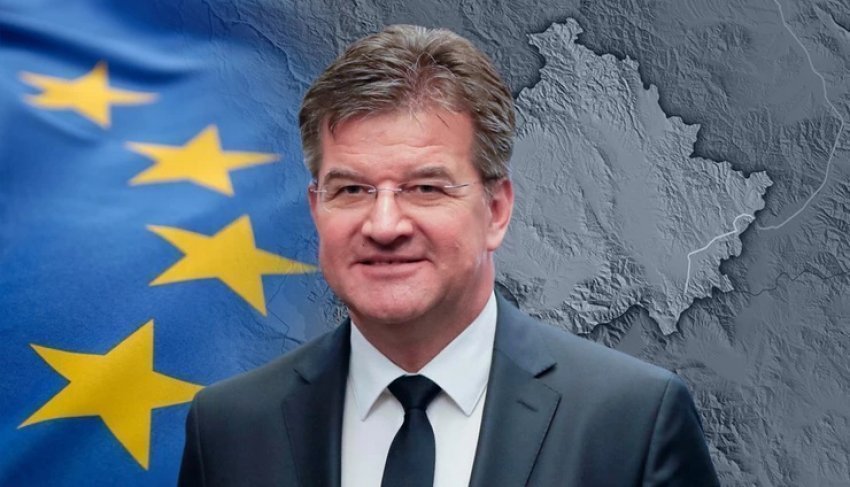Deputy Prime Minister Besnik Bislimi stated a few days ago that Miroslav Lajčak did not present the proposals of each side to the other regarding the sequencing plan for implementing the Basic Agreement.
“How can they propose ideas for implementing an agreement that they reject as non-existent? For this reason, at one point, we asked Mr. Lajčak to share the proposals of the other side with both parties. To show us what Serbia’s proposals have been so far and we gave our permission for our proposals to be shared with Serbia, with the idea of seeing if there have been proposals from Serbia, because even member states have been manipulated into believing that Serbia has made proposals,” Bislimi said. “And secondly, to see how far apart our positions are. Only when we have Serbia’s proposals and Serbia has ours will we be able to know if the 10th version is the final one or if there will be a 27th version. We need to know where we stand to understand what to expect at the next meeting in Brussels, but this was not supported, and I have a rough idea why it wasn’t,” he declared.
However, could such an action by the dialogue mediator impact the relations between the two states? Moreover, could it be intentional?
On this matter, ‘Bota Sot’ spoke with experts in international relations and political science.
Qarri: Criticism for the non-implementation of agreements reached in the dialogue has unjustly continued to be more directed against Kosovo
Political expert Gani Qarri stated that both the mediation style and the Kosovo-Serbia dialogue format, especially after the appointment of two high representatives as EU mediators from two non-recognizing countries of Kosovo, Miroslav Lajčak and Josep Borrell, have completely failed over the past four years. Therefore, the dismissal of the special envoy Gabriel Escobar, Miroslav Lajčak, and Josep Borrell is the best news for Kosovo within the context of the dialogue.
“This one-sided approach of Lajčak and Borrell has led to great mistrust between the Kosovar side and the two EU mediators. To make matters worse, Deputy Prime Minister Besnik Bislimi declared that Miroslav Lajčak did not present the proposals of each side to the other regarding the sequencing plan for implementing the Basic Agreement. Therefore, Mr. Bislimi’s statement is supported by experts in the Kosovo-Serbia dialogue process, who openly express that Lajčak’s paradoxical and pro-Serbia public approach has compromised the entire process. Instead of bringing the parties closer, Lajčak’s dubious approach has entirely blocked the dialogue between the two countries,” he assessed.
Furthermore, analyst Qarri emphasized that even experts in political affairs view the EU’s approach as paradoxical since the parties involved in the dialogue were not presented with each other’s comments on the sequencing plan for implementing the Basic Agreement. Deputy Prime Minister Bislimi clearly stated that Kosovo has already sent the requested comments to the EU envoy, Miroslav Lajčak, despite the fact that the EU never presented Kosovo with Serbia’s proposals.
“Considering that criticism for the non-implementation of agreements reached in the dialogue has unjustly continued to be more directed against Kosovo, this is another proof of bias towards Serbia. Therefore, the EU itself should be blamed for the stalemate in the dialogue. As both Deputy Prime Minister Besnik Bislimi and political developments experts rightly point out, Lajčak is also blamed for compromising the Kosovo-Serbia political dialogue. Such a paradoxical approach not only does not help the negotiations for reaching a final agreement but also severely impacts and exacerbates the relations between the two states, hindering the rapprochement of positions between the dialoguing parties. As long as one party is not present and does not know what proposal the other side has made, the situation becomes even more alarming and problematic, raising serious and reasonable doubts about what will actually happen and what decisions can be made in the separate meetings of the parties with the EU when the other dialoguing party is absent. These meetings should be held between both dialoguing parties in the presence of EU mediators, as has been done for over a decade in the marathon Kosovo-Serbia talks,” he emphasized.
The analyst stated that Lajčak’s actions are considered intentional, aimed at catching Kosovo off guard by Serbia and Serbian criminals, as evidenced by last year’s example in Banjë of Zvečan.
“Since it is necessary for the parties to have access to each other’s comments, Lajčak’s concealment of Serbia’s rejection of the agreement is not only highly compromising for him and the EU itself but is also suspected publicly, not only in Kosovo but also in the European and international circles, to be entirely intentional. This was aimed at catching Kosovo off guard by Serbia and Serbian criminals, as evidenced by last year’s example in Banjë of Zvečan. A hybrid attack from Serbia is always possible, so Kosovo must always be cautious and prepared continuously to ensure this does not happen again, ever and at any time in our country,” Qarri told ‘Bota Sot’.
Çipa: It is essential for the United States to have a more direct and, why not, an imposing role in the process
Expert in international relations, Akri Çipa, also spoke on this matter in an interview with ‘Bota Sot’. He said that, in general, it should be noted that the dialogue format, at this moment, has practically failed.
“Mr. Lajčak is nearing the end of his mandate as a special envoy for the dialogue, and his replacement can only benefit the process. Four years after he was appointed as a mediator with a one-year mandate, there has been no documented achievement. On the contrary, as evidenced by the current debate on whether the proposals from the parties were presented and the transparency between them, the dialogue has entered a dead end,” he said.
Çipa further emphasized that for there to be progress in a dialogue process like that of Kosovo-Serbia, either constructive engagement by the parties or a proactive mediator to advance the process is needed.
“In this specific case, both these elements have been missing. The dialogue process will now continue under the direction of a new mediator and, importantly, with a new High Representative in the European Union. It is important to have a revitalized process, using lessons from the mistakes of recent years. At the same time, it is essential for the United States to have a more direct and, why not, an imposing role in the process, to provide the necessary impetus to move from intermediate steps to a final agreement between the two countries,” he emphasized.



